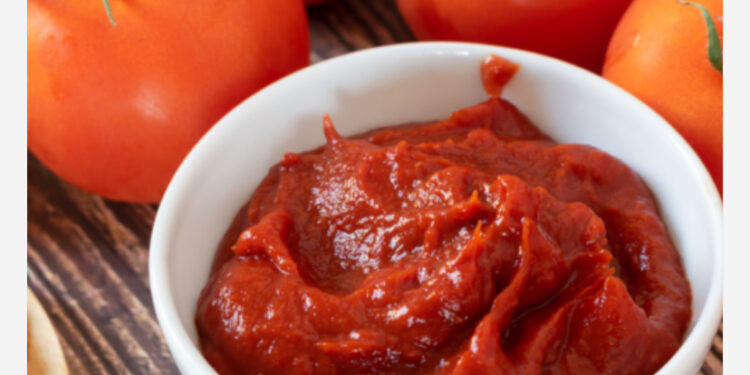Food Research Scientists at the Department of Food Science and Technology of the Kwame Nkrumah University of Science and Technology (KNUST) have detected a harmful banned substance in some tomato pastes sold on the Ghanaian market.
The substance, Erythrosine, also known as Red Dye No. 3, is used as a colourant in various foods, including toffees, candies, and drinks.
It may be labelled and appear on these products, as “Number 3.”
However, the Ghana Food and Drugs Authority (FDA) does not permit the substance to be used in the production of tomato paste.
This is because Erythrosine has been found to cause various health conditions and is not allowed in tomato paste production.
Starch is also prohibited in tomato paste formulations in Ghana.
However, a study by the food scientists from the KNUST on tomato paste sold in Ghana, found traces of both starch and erythrosine in some samples.
Tomato concentrate, which can be classified as either tomato paste or tomato mix, has become a convenient food item commonly used in Ghanaian homes, fast food outlets, and restaurants.
It offers a relatively cheap and quick alternative to fresh tomatoes, especially when tomatoes are out of season.
Over the years, concerns have been raised over the safety of tomato concentrate brands on the Ghanaian market.
The study, conducted in Kumasi and Accra, aimed to assess the quality of tomato concentrates, which are being sold on the market.
Eight different brand samples that conformed to standard labeling requirements were selected.
The researchers found that all the samples had a colour range from red to dark red, a paste-like appearance, and the characteristic taste of tomato concentrate, conforming to standard physical requirements.
According to production standards, tomato paste should contain at least 24 percent natural tomato content.
However, the total natural tomato content in some of the sampled brands fell outside this recommended range.
Alarmingly, erythrosine was detected in two samples, even though it was not indicated on the labels.
The study, published in the International Journal of Food Science, also found starch content ranging from 1g/100g to 24g/100g.
In January, the U.S. Food and Drug Administration (USFDA) completely banned erythrosine from food products due to its potential health risks and has given manufacturers two years to remove it from shelves and eliminate its use entirely.
The research, led by Dr. Abena Boakye of the Department of Food Science and Technology, of the university urged the Ghana FDA not to focus only on removing erythrosine from tomato products, but also extend its regulations to include the removal of the substance from confectioneries, candies, drinks, and other food products containing this harmful dye.
She said the findings should fuel further research and inform policymakers on the necessary steps to ensure the safety of food products available to consumers.
The researchers also recommended that the findings be used to inform stakeholders and guide necessary steps to provide safe tomato concentrates and other food products for consumers on the market.
GNA










Discussion about this post